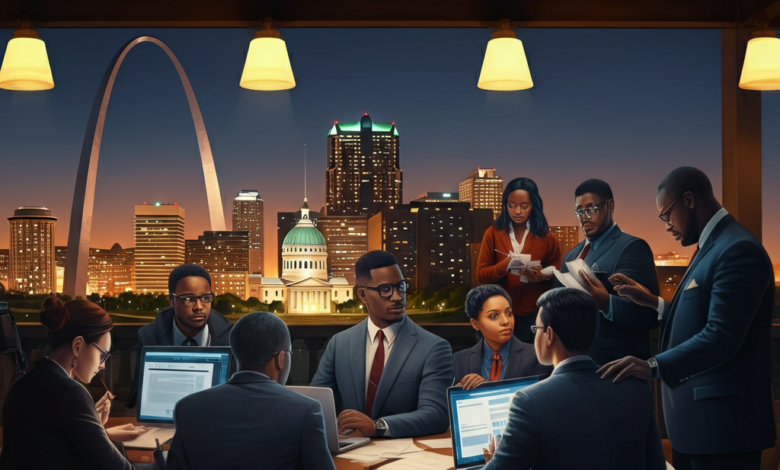Social Media Lawsuits in St. Louis: What You Need to Know

Social media has transformed how we communicate, share, and interact with the world, but it has also become a legal battleground for many. From defamation claims to privacy breaches, the growth of social media lawsuits is undeniable. St. Louis, as a bustling hub of businesses and active online communities, has witnessed its share of these legal disputes.
In this blog, we’ll unravel what social media lawsuits entail, examine notable St. Louis cases, tackle the key legal considerations, and share strategies to help you steer clear of trouble online. Whether you’re a casual social media user or a legal professional, understanding this dynamic is crucial in today’s digital age.
What Are Social Media Lawsuits?
A social media lawsuit involves legal claims that arise due to content shared or actions taken on platforms like Facebook, Twitter (now X), Instagram, TikTok, and others. While social media feels casual, it has serious legal implications. These lawsuits typically fall into the following categories:
Defamation
Defamation is one of the most common disputes on social media. If someone posts a false statement about another person, harming their reputation, they could be sued for libel (written defamation) or slander (spoken defamation). For instance, posting baseless claims about a local business or individual in St. Louis could make someone liable for damages.
Privacy Violations
When social media platforms or users collect, share, or misuse private information without consent, it can lead to lawsuits. This might include posting someone’s private photos, doxing (publicly sharing personal information like addresses), or failing to adhere to privacy policies.
Intellectual Property (IP) Infringement
Social media is filled with photos, videos, and creative content. Using content you do not own without permission can lead to IP infringement claims, whether it’s a borrowed photo for a post or an unauthorized use of copyrighted music.
Harassment or Cyberbullying
Harassment, threats, or bullying on social platforms can lead to serious legal repercussions. Victims, especially in St. Louis, can pursue lawsuits for emotional and psychological damages.
Case Studies in St. Louis
While social media-related lawsuits are a global phenomenon, St. Louis has seen its share of noteworthy cases. The following examples highlight the scope and impact of these disputes:
Case Study 1: Defamation in a Restaurant Review
A St. Louis restaurant faced defamation claims after a local influencer shared a harsh review based on false accusations. The restaurant owner filed a lawsuit, arguing that the claims were damaging to their business. This case underlined the importance of fact-checking before sharing opinions online.
Case Study 2: Privacy Breach Lawsuit
A St. Louis-area tech company found itself embroiled in a privacy-related lawsuit after sensitive customer data was shared on social media by a disgruntled former employee. The incident not only led to a legal dispute but also severely impacted the company’s reputation.
Case Study 3: Social Media Harassment in Local Communities
A prominent St. Louis figure filed a lawsuit against anonymous users who harassed her on social media. Using advanced legal tools, her lawyers traced the accounts and filed legal actions for emotional damages caused by the threatening messages.
These cases serve as a reminder that actions on social media often have real-world consequences.
Key Legal Considerations in Social Media Lawsuits
Navigating the legal aspects of a social media lawsuit can be complex, whether you’re the plaintiff or defendant. Here are some essential considerations:
For Plaintiffs (Those Filing a Lawsuit)
- Evidence is Crucial: To succeed in a lawsuit, you need concrete evidence. This might include screenshots, timestamps, or messages.
- Understand Your Rights: Laws surrounding defamation, privacy, and intellectual property vary. Consulting an attorney is critical to understanding your specific case.
- Weigh the Costs: Legal action can be expensive and time-consuming, so consider whether the potential outcome is worth the investment.
For Defendants (Those Being Sued)
- Seek Legal Advice: If you’re sued, consult an attorney immediately to understand your defense options.
- The Truth is a Defense: For defamation cases, proving that your statements were truthful can often protect you from liability.
- Act Quickly: Social media posts can go viral, increasing damages. Cooperate with legal counsel to resolve the issue fast.
Laws Impacting Social Media
- Section 230 of the Communications Decency Act largely protects platforms like Facebook and Twitter from liability for user-generated content. However, individual users remain responsible for the content they post.
- State-specific reforms and federal laws may vary in application, so it’s vital to consult legal professionals familiar with Missouri law.
How to Avoid Social Media Lawsuits
Prevention is always better than litigation. Here are practical strategies to reduce your risks on social media:
1. Think Before You Post
Before sharing a comment, photo, or video, ask yourself if it’s truthful, respectful, and compliant with platform rules. Avoid inflammatory or unverified statements.
2. Respect Privacy
Refrain from posting others’ personal information without their consent. For businesses, comply with privacy regulations when collecting or using customer data.
3. Use Licensed Content
If you’re using photos, music, or videos, ensure you have the rights to use them. Many platforms, such as Canva and Shutterstock, provide licensed content for creators.
4. Monitor Your Accounts
Keep an eye out for any user comments or posts that might infringe on legal rights. Regularly audit your business’s social media activity to ensure compliance.
5. Educate Employees
If you’re running a business, provide proper training for employees on acceptable social media use to prevent internal lapses that could lead to lawsuits.
6. Use Secure Passwords
Protect your social media accounts from being hacked using strong, unique passwords and enabling two-factor authentication.
Taking Responsibility for Online Actions
Social media is a powerful tool for connection and expression, but it comes with the responsibility to use it wisely. By understanding the legal implications and following best practices, you can enjoy the benefits of social media while avoiding costly lawsuits.



